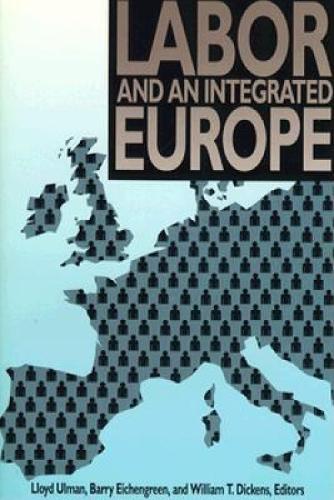
Labor and an Integrated Europe
(Paperback)
Publishing Details
Labor and an Integrated Europe
By (Author) Lloyd Ulman
Edited by William T. Dickens
Edited by Barry Eichengreen
Bloomsbury Publishing PLC
Brookings Institution
1st August 1993
United States
Classifications
Professional and Scholarly
Non Fiction
Sociology: work and labour
331.094
Physical Properties
Paperback
295
Width 156mm, Height 229mm, Spine 22mm
413g
Description
As the European Community moves towards full integration of its members' economies, one of the most far-reaching changes will be in the European labour market. The increased mobility of labour - as well as capital, goods, and services - will have profound consequences for workers, employers and unions. The authors address such questions as: will European unions become more decentralized and increase their infuence; will the German system of industrial relations serve as a model for power-sharing between workers and managers; do benefits systems hinder worker mobility; will the completion of the EC internal market lead to reductions in the disparities in incomes across countries; are European immigration policies responsible for creating unemployment in several countries; and, what are the implicaitons of integration for other parts of the world
Reviews
"This volume provides a useful and timely treatise on a number of issues as Western Europe looks to Eastern Europe in the context of emerging relationships." Choice
|"This volume offers an illuminating analysis of the challenge that European integration will se for European labor." Katharine G. Abraham, University of Maryland
|"The impact of economic integration on labor markets among counties with different living standards is once again hot topic. This is the authoritative volume on European experience with wages, employment, and conditions of work. Among other reasons, it should be read as a benchmark for possible trends in North America." Gary Clyde Hufbauer, Institute for International Economics
|"This book does an excellent job of framing the labor market an industrial relations challenges facing an integrated Europe. It demonstrates why these topics can no longer be studied as independent national systems and illustrates the need for all of us in this field to become true internationalists." Thomas A. Kochan, Massachusetts Institute of Technology
|"This is an excellent and most timely set of essays. It brings the perspective of institutionally oriented economists, sociologists, and political scientist to bear on the labor market policy issues which well be central to the European Community's development over the next decade, regardless of the fate of the specific Maastricht Treaty provisions. Comparative and historical in scope, the essays set these issues in a context which should e most useful to scholars, students, and policymakers alike. There is really nothing as sharply focused and contemporary available. I recommend it highly." Peter Lange, Duke University
Author Bio
Lloyd Ulman is an economist at the University of California at Berkeley. Barry Eichengreen is George C. Pardee and Helen N. Pardee Professor of Economics and Political Science at the University of California --Berkeley. His books include The European Economy since 1945 (Princeton, 2007) and Global Imbalances: The Lessons of Bretton Woods (MIT, 2006). William T. Dickens, a senior fellow in the Economics Studies program at the Brookings Institution, was previously a senior economist on the President's Council of Economic Advisers and professor of economics at the University of California, Berkeley.
